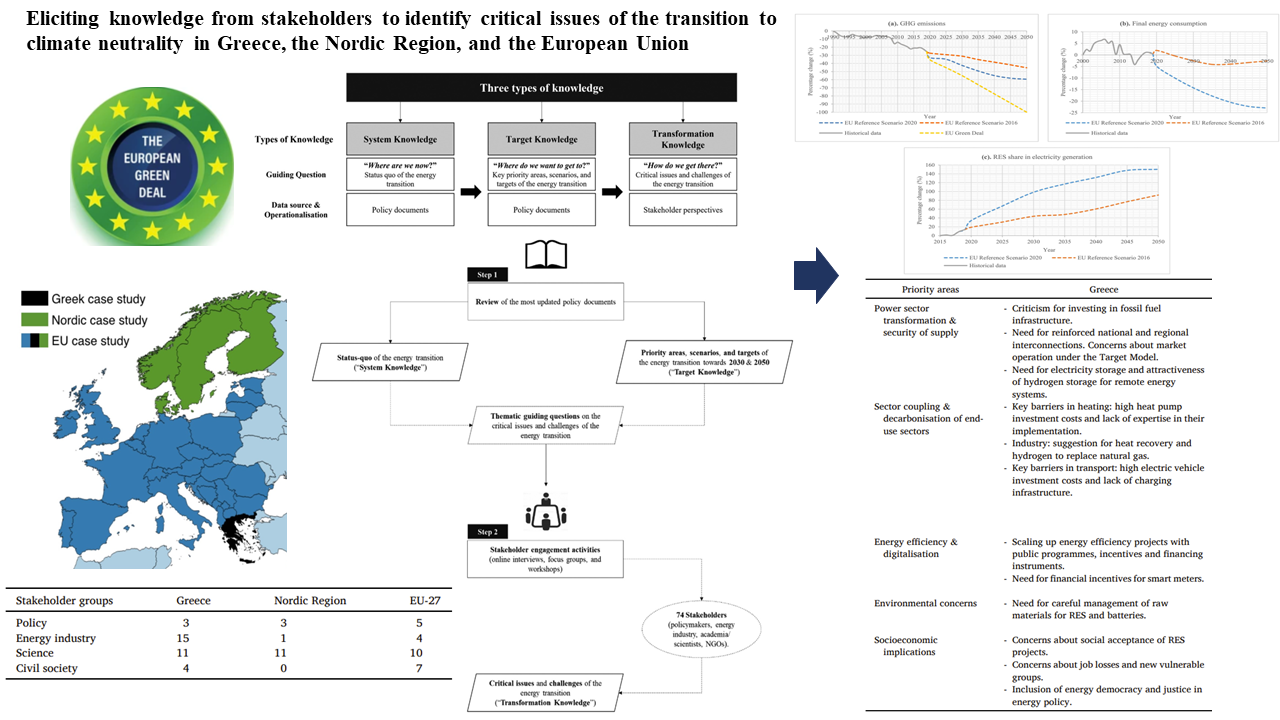
Despite the Europeanisation of energy policy, energy systems across Europe vary significantly, and thus, a systemic approach is required to accelerate and facilitate the European energy transition in order to reflect on the differences that exist between the energy systems across Europe, and to build on the current state of knowledge about potential transition pathways. The European Union is highly heterogeneous across, but also within, Member States. Some countries are benefiting from abundant natural resources, while economies of others are largely dependent on fossil fuels or nuclear energy. Moreover, Member States’ energy systems vary greatly, considering local factors, capacities, constraints, and prior decisions. This divergence illuminates the considerable differences in the motivation, speed, and level of decarbonisation with which the energy transition has been pursued in the energy systems across European countries and regions thus far.
In this context, different countries and regions will require different pathways to climate neutrality. A lack of reflection over these differences carries the risk that Europe will be decarbonised and transformed into a “two-speed” way, thus providing most of the gains of clean energy investments to Western European “climate leaders”. Such an effect can exacerbate spatial unevenness and inequality across Europe. In that sense, a better understanding of what is known, what is partially known, and what is currently unknown with respect to the different energy systems across Europe is required. As a result, it is critical to draw on lessons learnt by Member States and understand the different context-specific challenges and issues of the energy transition to advance collaboration and accelerate climate efforts globally.
To do so, we applied a multi-method approach combining a policy document analysis with multitudinous stakeholder engagement and cross-case comparisons in three case studies with different geographical and socioeconomic contexts and scales.
Our findings showed that, when comparing the perspectives of stakeholders representing different European regions, we observe differences particularly regarding views on the flexibility of the energy system, carbon capture and negative emission technologies, the role of nuclear energy and natural gas, and considerations of societal challenges. We also find similarities in terms of the interconnectedness of the energy system, the role of hydrogen for decarbonising the industry and transport sectors, energy efficient renovations and digitalisation, technology demand for raw materials and social acceptance and distributional effects of the transition.
Papers:
Kleanthis, N., Stavrakas, V., Ceglarz, A., Süsser, D., Schibline, A., Lilliestam, J., Flamos, A. Eliciting knowledge from stakeholders to identify critical issues of the transition to climate neutrality in Greece, the Nordic Region, and the European Union, Energy Research & Social Science, Volume 93, 2022, https://doi.org/10.1016/j.erss.2022.102836.
Stavrakas, V., Ceglarz, A., Kleanthis, N., Giannakidis, G., Schibline, A., Süsser, D., Lilliestam, J., Psyrri, A., & Flamos, A. (2021). Case specification and scheduling. Deliverable 7.1. Sustainable Energy Transitions Laboratory (SENTINEL) project. Zenodo. https://doi.org/10.5281/zenodo.4699518.
Stavrakas, V., Kleanthis, N., & Giannakidis, G. (2021). “Energy transition in Greece towards 2030 & 2050: Critical issues, challenges & research priorities. Stakeholder Interview Meetings – A Synthesis Report”: Sustainable Energy Transitions Laboratory (SENTINEL) project (Final). Zenodo. https://doi.org/10.5281/zenodo.7197694.
Ceglarz, A., & Schibline, A. (2021). “The Nordic Region – a frontrunner of the decarbonised energy system. Workshop Synthesis Report”: Sustainable Energy Transitions Laboratory (SENTINEL) project (Final). Zenodo. https://doi.org/10.5281/zenodo.7197779.
Ceglarz, A., & Schibline, A. (2021). “The future of the European energy system: Unveiling the blueprint towards a climate-neutral economy. Workshop Synthesis Report”: Sustainable Energy Transitions Laboratory (SENTINEL) project (Final). Zenodo. https://doi.org/10.5281/zenodo.7197737.
SENTINEL case study
Case study: Continental – Europe
Europe-wide opportunities and trade-offs with particular reflection on the concerns, needs and demands of stakeholders.
DetailsCase study: National – Greece
Country-specific case with focus on coal phase-out together with a large domestic renewable potential.
DetailsCase study: Regional – Nordic
Case with focus on the Nordic region's strong lead in sector coupling and heating innovation.
Details